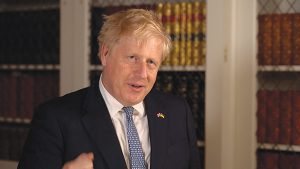How can the Tories dump a leader who has been as successful at winning elections and riding out controversy as Boris Johnson? And yet how can they stick with one whose character has become a liability, whom the public distrusts and whom many see as a threat to the integrity of governing institutions?
The answer to both questions seems to be, they don’t know. Johnson’s party still can’t decide if it’s better off with him or without him. The result of that indecision is likely to be an increasingly fractious governing party and more polarised political climate.
It’s never a good sign for a prime minister to face a confidence vote. But like rain in a British summer, the vote had the feeling of inevitability about it. It was triggered by at least 15% of Johnson’s parliamentary colleagues submitting letters of no-confidence to the 1922 Committee of backbench MPs.
Johnson needed the backing of 180 Tory MPs to stay on as party leader, and he got it. But by winning only 211 of his MPs — 59% support, less than the 63% that Theresa May received, six months before she was forced out — he is walking wounded.
Johnson has been known for his Houdini-like ability to wriggle out of impossible binds. Still, the obstacles this time are different. If you take out all those MPs who are on the government payroll in one way or another, that leaves a razor thin voting majority.
A win is a win, Johnson’s supporters have said. And he has made clear he wanted the vote to draw a line under matters. That’s wishful thinking.
Three parliamentary apologies, a number of policy U-turns, emergency spending plans and the Sue Gray report into lockdown rule-breaking all failed to resolve the underlying tension between Tories who see him as a vote-winner and those who view him as a liability. The vote doesn’t alleviate that pressure.
The Tories are expected to lose two by-elections later this month. While Johnson’s majority is large enough that he can afford the hit and Johnson’s defenders note that governments often take a beating in mid-term votes, a number of recent local election losses makes a worrying trend and will only add to calls for his resignation.
Nor is Partygate over. Johnson faces the Parliamentary privileges committee investigation into whether he broke the ministerial code in his handling of allegations of gathering during lockdown.
That is normally a resigning offense, but nobody expects a prime minister who has made a trademark of
defying convention to abide by it.
While winning the confidence vote doesn’t get Johnson off the hook, it does put the ball in his court. In the past, when faced with internal opposition, Johnson’s go-to strategy has been to purge disbelievers and tack hard to the right. We’re now more likely to see both.
The prime minister successfully rid his party of Brexit opponents after winning the 2019 election, creating a sense of internal unity for a time. We can expect him to reward loyalists and sideline dissenters again.
The highly personal attack by Johnson’s Secretary of State for Digital, Culture, Media and Sport, Nadine Dorries, on former foreign secretary Jeremy Hunt (a potential leadership contender) offered a hint of how nasty this could get.
—Bloomberg
 The Gulf Time Newspaper One of the finest business newspapers in the UAE brought to you by our professional writers and editors.
The Gulf Time Newspaper One of the finest business newspapers in the UAE brought to you by our professional writers and editors.
